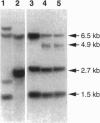Abstract
The silver (svr) gene of Drosophila melanogaster is required for viability, and severe mutant alleles result in death prior to eclosion. Adult flies homozygous or hemizygous for weaker alleles display several visible phenotypes, including cuticular structures that are pale and silvery in color due to reduced melanization. We have identified and cloned the DNA encoding the svr gene and determined the sequence of several partially overlapping cDNAs derived from svr mRNAs. The predicted amino acid sequence of the polypeptides encoded by these cDNAs indicates that the silver proteins are members of the family of preprotein-processing carboxypeptidases that includes the human carboxypeptidases E, M, and N. One class of svr mRNAs is alternatively spliced to encode at least two polyproteins, each of which is composed of two carboxypeptidase domains.
Full text
PDF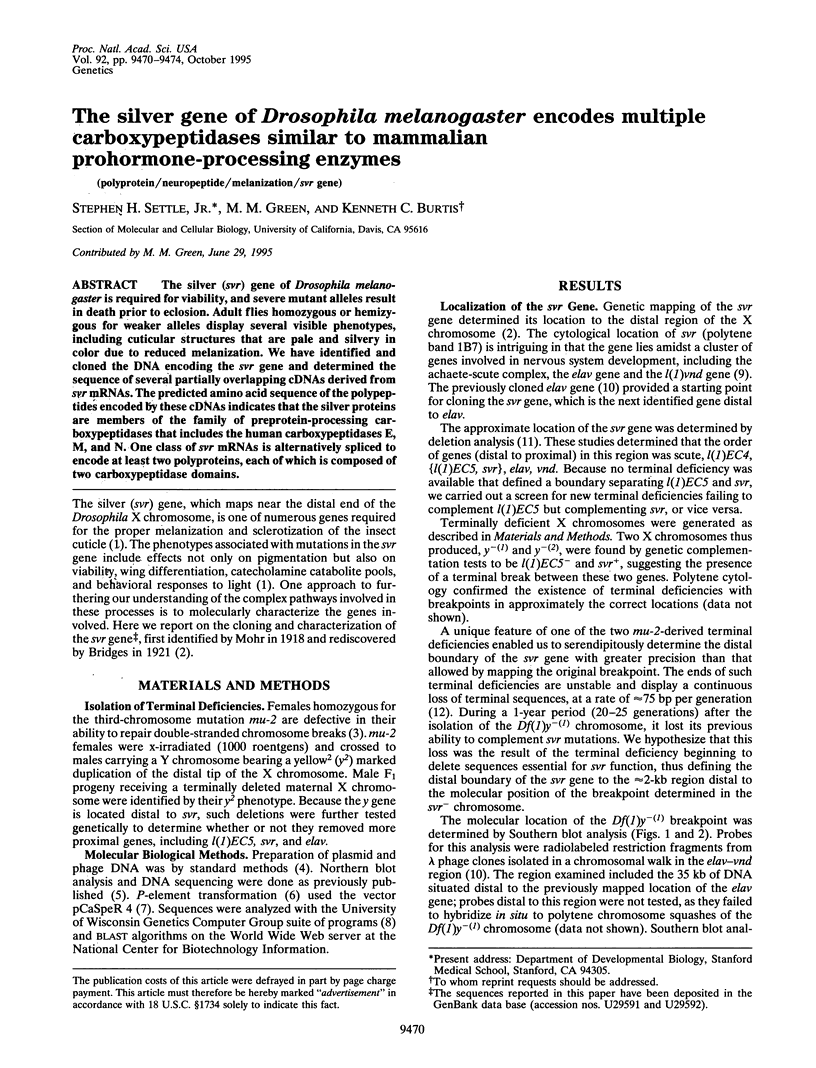
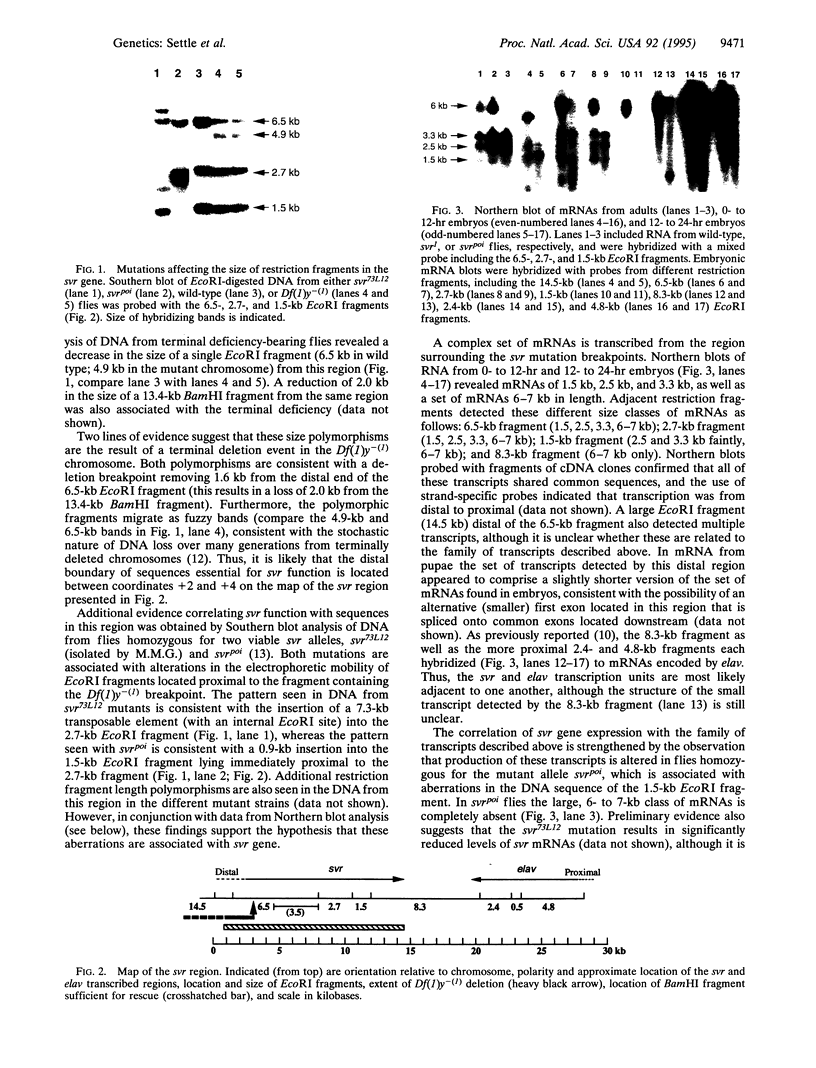
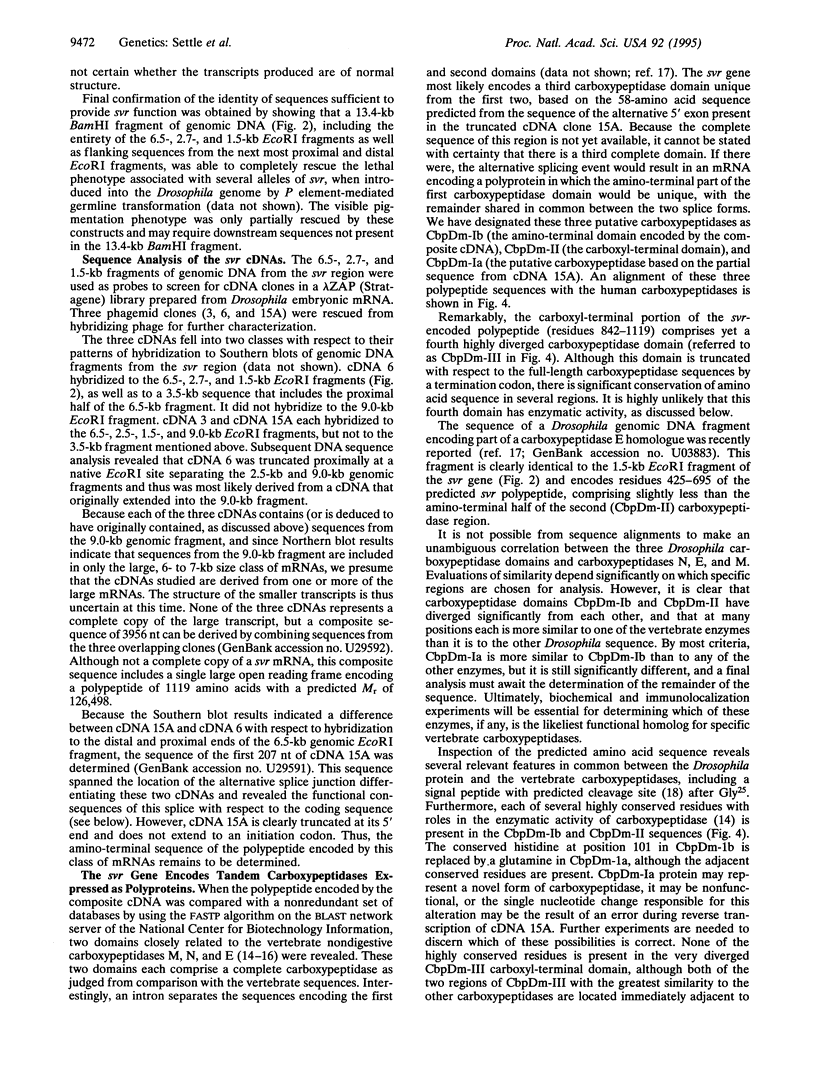
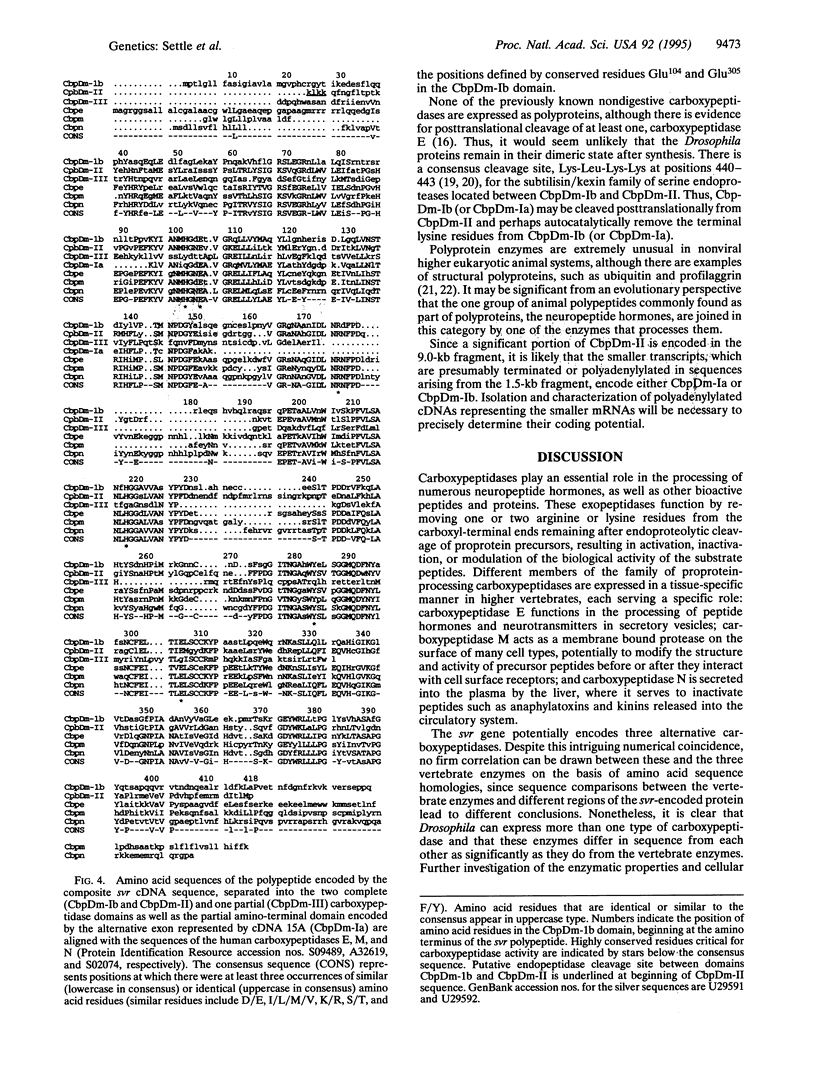
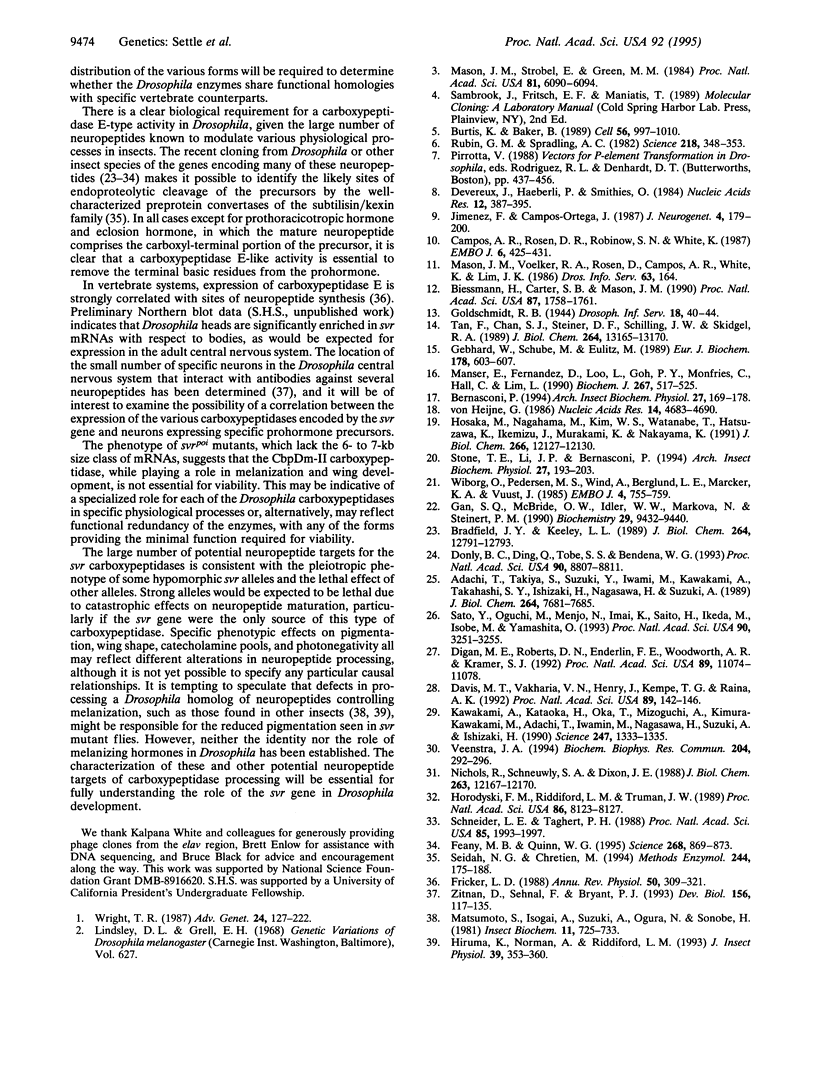
Images in this article
Selected References
These references are in PubMed. This may not be the complete list of references from this article.
- Adachi T., Takiya S., Suzuki Y., Iwami M., Kawakami A., Takahashi S. Y., Ishizaki H., Nagasawa H., Suzuki A. cDNA structure and expression of bombyxin, an insulin-like brain secretory peptide of the silkmoth Bombyx mori. J Biol Chem. 1989 May 5;264(13):7681–7685. [PubMed] [Google Scholar]
- Bernasconi P. Molecular cloning of a Drosophila melanogaster gene coding for an homologue of human carboxypeptidase E. Arch Insect Biochem Physiol. 1994;27(3):169–178. doi: 10.1002/arch.940270303. [DOI] [PubMed] [Google Scholar]
- Biessmann H., Carter S. B., Mason J. M. Chromosome ends in Drosophila without telomeric DNA sequences. Proc Natl Acad Sci U S A. 1990 Mar;87(5):1758–1761. doi: 10.1073/pnas.87.5.1758. [DOI] [PMC free article] [PubMed] [Google Scholar]
- Bradfield J. Y., Keeley L. L. Adipokinetic hormone gene sequence from Manduca sexta. J Biol Chem. 1989 Aug 5;264(22):12791–12793. [PubMed] [Google Scholar]
- Burtis K. C., Baker B. S. Drosophila doublesex gene controls somatic sexual differentiation by producing alternatively spliced mRNAs encoding related sex-specific polypeptides. Cell. 1989 Mar 24;56(6):997–1010. doi: 10.1016/0092-8674(89)90633-8. [DOI] [PubMed] [Google Scholar]
- Campos A. R., Rosen D. R., Robinow S. N., White K. Molecular analysis of the locus elav in Drosophila melanogaster: a gene whose embryonic expression is neural specific. EMBO J. 1987 Feb;6(2):425–431. doi: 10.1002/j.1460-2075.1987.tb04772.x. [DOI] [PMC free article] [PubMed] [Google Scholar]
- Davis M. T., Vakharia V. N., Henry J., Kempe T. G., Raina A. K. Molecular cloning of the pheromone biosynthesis-activating neuropeptide in Helicoverpa zea. Proc Natl Acad Sci U S A. 1992 Jan 1;89(1):142–146. doi: 10.1073/pnas.89.1.142. [DOI] [PMC free article] [PubMed] [Google Scholar]
- Devereux J., Haeberli P., Smithies O. A comprehensive set of sequence analysis programs for the VAX. Nucleic Acids Res. 1984 Jan 11;12(1 Pt 1):387–395. doi: 10.1093/nar/12.1part1.387. [DOI] [PMC free article] [PubMed] [Google Scholar]
- Digan M. E., Roberts D. N., Enderlin F. E., Woodworth A. R., Kramer S. J. Characterization of the precursor for Manduca sexta diuretic hormone Mas-DH. Proc Natl Acad Sci U S A. 1992 Nov 15;89(22):11074–11078. doi: 10.1073/pnas.89.22.11074. [DOI] [PMC free article] [PubMed] [Google Scholar]
- Donly B. C., Ding Q., Tobe S. S., Bendena W. G. Molecular cloning of the gene for the allatostatin family of neuropeptides from the cockroach Diploptera punctata. Proc Natl Acad Sci U S A. 1993 Oct 1;90(19):8807–8811. doi: 10.1073/pnas.90.19.8807. [DOI] [PMC free article] [PubMed] [Google Scholar]
- Feany M. B., Quinn W. G. A neuropeptide gene defined by the Drosophila memory mutant amnesiac. Science. 1995 May 12;268(5212):869–873. doi: 10.1126/science.7754370. [DOI] [PubMed] [Google Scholar]
- Fricker L. D. Carboxypeptidase E. Annu Rev Physiol. 1988;50:309–321. doi: 10.1146/annurev.ph.50.030188.001521. [DOI] [PubMed] [Google Scholar]
- Gan S. Q., McBride O. W., Idler W. W., Markova N., Steinert P. M. Organization, structure, and polymorphisms of the human profilaggrin gene. Biochemistry. 1990 Oct 9;29(40):9432–9440. doi: 10.1021/bi00492a018. [DOI] [PubMed] [Google Scholar]
- Gebhard W., Schube M., Eulitz M. cDNA cloning and complete primary structure of the small, active subunit of human carboxypeptidase N (kininase 1). Eur J Biochem. 1989 Jan 2;178(3):603–607. doi: 10.1111/j.1432-1033.1989.tb14488.x. [DOI] [PubMed] [Google Scholar]
- Horodyski F. M., Riddiford L. M., Truman J. W. Isolation and expression of the eclosion hormone gene from the tobacco hornworm, Manduca sexta. Proc Natl Acad Sci U S A. 1989 Oct;86(20):8123–8127. doi: 10.1073/pnas.86.20.8123. [DOI] [PMC free article] [PubMed] [Google Scholar]
- Hosaka M., Nagahama M., Kim W. S., Watanabe T., Hatsuzawa K., Ikemizu J., Murakami K., Nakayama K. Arg-X-Lys/Arg-Arg motif as a signal for precursor cleavage catalyzed by furin within the constitutive secretory pathway. J Biol Chem. 1991 Jul 5;266(19):12127–12130. [PubMed] [Google Scholar]
- Jiménez F., Campos-Ortega J. A. Genes in subdivision 1B of the Drosophila melanogaster X-chromosome and their influence on neural development. J Neurogenet. 1987 Jun;4(4):179–200. [PubMed] [Google Scholar]
- Kawakami A., Kataoka H., Oka T., Mizoguchi A., Kimura-Kawakami M., Adachi T., Iwami M., Nagasawa H., Suzuki A., Ishizaki H. Molecular cloning of the Bombyx mori prothoracicotropic hormone. Science. 1990 Mar 16;247(4948):1333–1335. doi: 10.1126/science.2315701. [DOI] [PubMed] [Google Scholar]
- Manser E., Fernandez D., Loo L., Goh P. Y., Monfries C., Hall C., Lim L. Human carboxypeptidase E. Isolation and characterization of the cDNA, sequence conservation, expression and processing in vitro. Biochem J. 1990 Apr 15;267(2):517–525. doi: 10.1042/bj2670517. [DOI] [PMC free article] [PubMed] [Google Scholar]
- Mason J. M., Strobel E., Green M. M. mu-2: mutator gene in Drosophila that potentiates the induction of terminal deficiencies. Proc Natl Acad Sci U S A. 1984 Oct;81(19):6090–6094. doi: 10.1073/pnas.81.19.6090. [DOI] [PMC free article] [PubMed] [Google Scholar]
- Nichols R., Schneuwly S. A., Dixon J. E. Identification and characterization of a Drosophila homologue to the vertebrate neuropeptide cholecystokinin. J Biol Chem. 1988 Sep 5;263(25):12167–12170. [PubMed] [Google Scholar]
- Rubin G. M., Spradling A. C. Genetic transformation of Drosophila with transposable element vectors. Science. 1982 Oct 22;218(4570):348–353. doi: 10.1126/science.6289436. [DOI] [PubMed] [Google Scholar]
- Sato Y., Oguchi M., Menjo N., Imai K., Saito H., Ikeda M., Isobe M., Yamashita O. Precursor polyprotein for multiple neuropeptides secreted from the suboesophageal ganglion of the silkworm Bombyx mori: characterization of the cDNA encoding the diapause hormone precursor and identification of additional peptides. Proc Natl Acad Sci U S A. 1993 Apr 15;90(8):3251–3255. doi: 10.1073/pnas.90.8.3251. [DOI] [PMC free article] [PubMed] [Google Scholar]
- Schneider L. E., Taghert P. H. Isolation and characterization of a Drosophila gene that encodes multiple neuropeptides related to Phe-Met-Arg-Phe-NH2 (FMRFamide). Proc Natl Acad Sci U S A. 1988 Mar;85(6):1993–1997. doi: 10.1073/pnas.85.6.1993. [DOI] [PMC free article] [PubMed] [Google Scholar]
- Seidah N. G., Chrétien M. Pro-protein convertases of subtilisin/kexin family. Methods Enzymol. 1994;244:175–188. doi: 10.1016/0076-6879(94)44015-8. [DOI] [PubMed] [Google Scholar]
- Stone T. E., Li J. P., Bernasconi P. Purification and characterization of the Manduca sexta neuropeptide processing enzyme carboxypeptidase E. Arch Insect Biochem Physiol. 1994;27(3):193–203. doi: 10.1002/arch.940270305. [DOI] [PubMed] [Google Scholar]
- Tan F., Chan S. J., Steiner D. F., Schilling J. W., Skidgel R. A. Molecular cloning and sequencing of the cDNA for human membrane-bound carboxypeptidase M. Comparison with carboxypeptidases A, B, H, and N. J Biol Chem. 1989 Aug 5;264(22):13165–13170. [PubMed] [Google Scholar]
- Veenstra J. A. Isolation and structure of the Drosophila corazonin gene. Biochem Biophys Res Commun. 1994 Oct 14;204(1):292–296. doi: 10.1006/bbrc.1994.2458. [DOI] [PubMed] [Google Scholar]
- Wiborg O., Pedersen M. S., Wind A., Berglund L. E., Marcker K. A., Vuust J. The human ubiquitin multigene family: some genes contain multiple directly repeated ubiquitin coding sequences. EMBO J. 1985 Mar;4(3):755–759. doi: 10.1002/j.1460-2075.1985.tb03693.x. [DOI] [PMC free article] [PubMed] [Google Scholar]
- Wright T. R. The genetics of biogenic amine metabolism, sclerotization, and melanization in Drosophila melanogaster. Adv Genet. 1987;24:127–222. [PubMed] [Google Scholar]
- Zitnan D., Sehnal F., Bryant P. J. Neurons producing specific neuropeptides in the central nervous system of normal and pupariation-delayed Drosophila. Dev Biol. 1993 Mar;156(1):117–135. doi: 10.1006/dbio.1993.1063. [DOI] [PubMed] [Google Scholar]
- von Heijne G. A new method for predicting signal sequence cleavage sites. Nucleic Acids Res. 1986 Jun 11;14(11):4683–4690. doi: 10.1093/nar/14.11.4683. [DOI] [PMC free article] [PubMed] [Google Scholar]



